October 17, 2017
Record demand for London West End offices boosted by tech and media firms
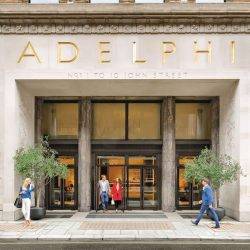 Take up of new commercial offices in London’s West End in September 2017 hit the highest quarterly total on record – with tech and media firms, along with serviced office schemes being the most active, according to figures from real estate advisor Savills. The take-up was 857,259 sq ft (79,639 sq m) – bringing total take-up by the third quarter to 1.62 million sq ft (150,498 sq m). Leasing activity in the third quarter of 2017 brings total take-up year to date, to 3.99 million sq ft (370,671 sq m), which already surpasses 2016’s total annual take-up (3.97 million sq ft) and places the West End in a strong position to exceed the record 4.3 million sq ft (399,470 sq m) amassed in 2015. Key deals that helped elevate the market included: Aegis pre-letting the entire 310,000 sq ft (28,799 sq m) at British Land’s 1 Triton Square; The Boston Consulting Group pre-letting 123,500 sq ft (11,473 sq m) at 80 Charlotte Street and Spotify acquiring 104,133 sq ft (9,674 sq m) at The Adelphi.
Take up of new commercial offices in London’s West End in September 2017 hit the highest quarterly total on record – with tech and media firms, along with serviced office schemes being the most active, according to figures from real estate advisor Savills. The take-up was 857,259 sq ft (79,639 sq m) – bringing total take-up by the third quarter to 1.62 million sq ft (150,498 sq m). Leasing activity in the third quarter of 2017 brings total take-up year to date, to 3.99 million sq ft (370,671 sq m), which already surpasses 2016’s total annual take-up (3.97 million sq ft) and places the West End in a strong position to exceed the record 4.3 million sq ft (399,470 sq m) amassed in 2015. Key deals that helped elevate the market included: Aegis pre-letting the entire 310,000 sq ft (28,799 sq m) at British Land’s 1 Triton Square; The Boston Consulting Group pre-letting 123,500 sq ft (11,473 sq m) at 80 Charlotte Street and Spotify acquiring 104,133 sq ft (9,674 sq m) at The Adelphi.





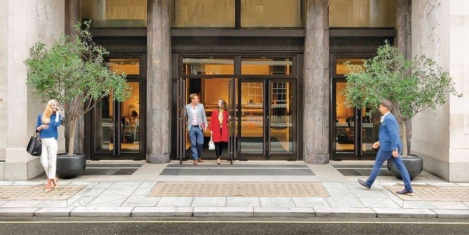




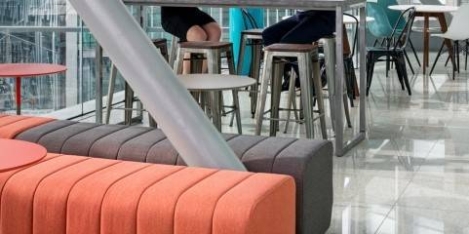
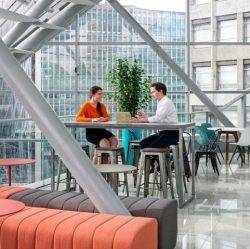

 Research published to mark the beginning of
Research published to mark the beginning of 




 Strong demand and a lack of supply is helping to boast the regional office rental market, according to Savills’ latest Regional Offices Market Watch. The firm anticipates that take-up will reach 9.8 million sq ft (910,450 sq m) by the end of 2017, a 4 percent increase on 2016 and 9 percent up on the 10 year average. This is due to a number of large Government Property Unit (GPU) deals completing in the second half of the year. As a result of strong demand, total availability across the UK fell by 1 percent to 30 million sq ft (2.787 million sq m) in the first half of the year, which equates to just 1.8 years worth of available Grade A supply. What’s more, Savills notes that office based employment across the regional cities is forecast to grow by up to 4.6 percent over the next five years, leading to a net additional 55,000 jobs, representing a need for a further 5 million sq ft (464,616 sq m) of office space.
Strong demand and a lack of supply is helping to boast the regional office rental market, according to Savills’ latest Regional Offices Market Watch. The firm anticipates that take-up will reach 9.8 million sq ft (910,450 sq m) by the end of 2017, a 4 percent increase on 2016 and 9 percent up on the 10 year average. This is due to a number of large Government Property Unit (GPU) deals completing in the second half of the year. As a result of strong demand, total availability across the UK fell by 1 percent to 30 million sq ft (2.787 million sq m) in the first half of the year, which equates to just 1.8 years worth of available Grade A supply. What’s more, Savills notes that office based employment across the regional cities is forecast to grow by up to 4.6 percent over the next five years, leading to a net additional 55,000 jobs, representing a need for a further 5 million sq ft (464,616 sq m) of office space.


 The majority of North American office workers expect their employers to provide technology that allows them to work from wherever they choose and three quarter of employees (74 percent) would rather leave their job to work for an organisation that would allow them to work remotely more often, even if their salary stayed the same. This is because working remotely has moved from being a work perk to a necessity of 21
The majority of North American office workers expect their employers to provide technology that allows them to work from wherever they choose and three quarter of employees (74 percent) would rather leave their job to work for an organisation that would allow them to work remotely more often, even if their salary stayed the same. This is because working remotely has moved from being a work perk to a necessity of 21








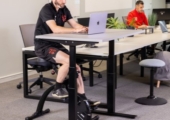
October 19, 2017
Future office and changing business of work debated at Workplace Trends
by Sara Bean • Comment, Coworking, Facilities management, Technology, Wellbeing, Workplace design
More →